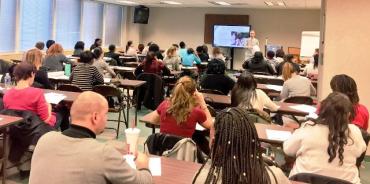In late January and early February, the AFT and its affiliate the United Federation of Teachers held student debt clinics in each of the five boroughs of New York City, guiding some 1,000 people toward relief from the weight of their student loans. Across the country, AFT staff ran a clinic a week last year, and state and local affiliates are signing up for training sessions so that they can offer the workshops themselves, exponentially increasing the number of people served.
Soaring student debt may seem like old news, but for those individuals in its grip it feels relentlessly fresh and relevant.
And so the AFT's debt clinics continue, detailing the path to debt relief—from income-based repayment plans to public service loan forgiveness. Participants frequently come away with dramatically lower monthly payments on their student loans. Recently, a firefighter reduced his payment from more than $300 to just $32 and learned the loans would eventually be forgiven through the public service loan forgiveness program. PSLF forgives student debt for borrowers who work in public service jobs like firefighting, teaching and government positions, and who make regular monthly payments for 10 years. At an earlier workshop, another participant dropped $600 from her monthly payment, declaring it was the biggest raise she'd ever gotten.
Since their inception in 2015, AFT debt clinics have offered information about underutilized federal programs that provide debt relief to those who know about them. Income-based repayment plans, for example, adjust monthly loan payments according to a person's actual income. Public service loan forgiveness, as described above, benefits those who devote their working lives to the public good.
Information about these and other debt relief programs is available on the AFT website ForgiveMyStudentDebt.org, where tens of thousands of people have gotten help with the application process, eligibility questions and default-related matters. There are even tips taken directly from other borrowers who have been there, done that. "Watch your [loan] statements, and I don't just mean check them periodically. Watch them like a hawk," says one, warning against sloppy loan servicers. Another cautions against ads offering to lower your monthly payments for a fee. "You can enroll in income-based repayment plans or public service loan forgiveness for free," she writes. "Don't let scam artists tell you otherwise."
Still, tens of thousands more borrowers remain unaware of loan forgiveness options. The Consumer Financial Protection Bureau estimates that 34 million people qualify for public service loan forgiveness, but fewer than 740,000 have enrolled. Now that the program is being threatened by Congress, a campaign to protect it is underway with partners from the military, the police and food safety professionals.
Meanwhile, student debt continues to cripple individuals and drag down the economy. People are delaying purchases such as homes and cars, and waiting to start families. "We've had to discuss the feasibility of trying for a second child when the cost of living and child care is so high," says student loan borrower Rae Dunnaville, whose husband also borrowed to attend college. Anna Peak, a member of the Temple Association of University Professionals and a humanities professor at Temple University, says her students are reluctant to take the classes that interest them most. "They are thinking, 'I need to get through this program as soon as possible with as high a grade as possible, get my business degree or computer science degree so I can get a high-paying job to pay off my student loans.' "
So the AFT continues to fight—not just by helping individuals handle their debt but by working to change the policies that got them there in the first place. AFT members and leaders have rallied, written articles and letters, and testified before federal policymakers to press for change that would make loan servicers more accountable and address the soaring default rates at for-profit colleges.
For-profits are a big part of the student debt problem: Together they gobble up 25 percent of all federal financial aid dollars but enroll only 10 to 13 percent of college students, making a disproportionate impact on borrowers. And many of them cheat students out of their money with subpar education that leaves them unable to find employment, and therefore unable to pay back their loans.
The AFT is deep in the fight against these exploitative institutions—which means it is also fighting Education Secretary Betsy DeVos, as she tries to loosen the regulations that help keep for-profits in check. Among the regulations are gainful employment rules, which require for-profit colleges to prove that their graduates are educated well enough to find jobs upon graduation; and borrower-defense claims, which forgive debt in cases where the student loans went to pay for colleges that defrauded their students with inferior education. The AFT has also fought against deceptive and predatory student loan servicing that can cause borrowers to default on their loans. (Read more here and here.)
[Virginia Myers]


